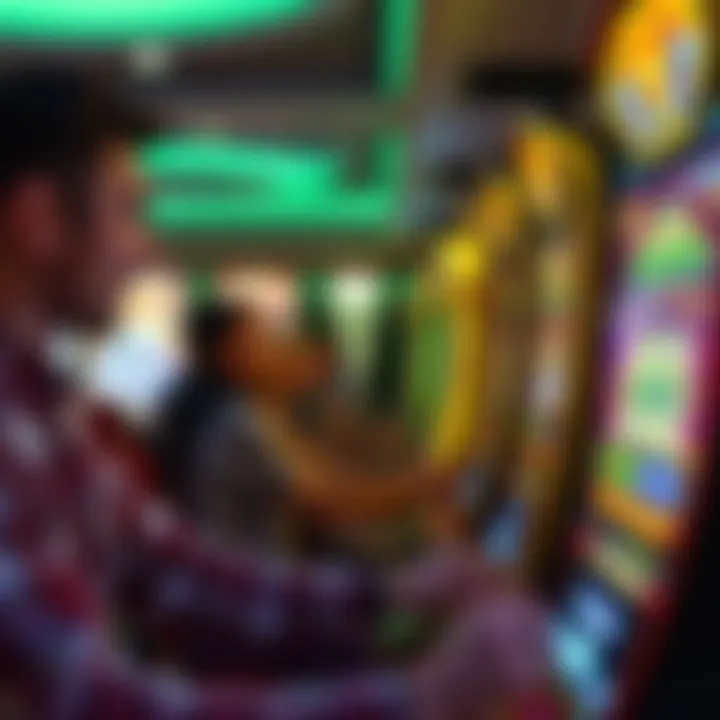Exploring Gaming Culture Through Invaders from the Planet Moolah


Intro
In a landscape where technology and entertainment blend seamlessly, gaming culture has transformed in remarkable ways. To understand this evolution, 'Invaders from the Planet Moolah' serves as a prime example, illustrating how innovative gaming experiences reshape the traditional gaming and gambling sectors. This exploration offers insights not just into the mechanics of the game, but also delves into the psychological and socio-economic undercurrents that influence player behavior.
As gaming continues to rise in popularity, online casinos now attract a wide array of players—from seasoned gamblers looking for their next big win to novices curious about the intricate world of digital wagering. The nuances of Invaders from the Planet Moolah highlight these dynamics, offering a unique lens through which one can view the broader trends of the gaming industry.
This article aims to dissect key concepts, strategies, and emerging trends that define the current state of gaming culture. Such understanding becomes crucial as we navigate through challenges and opportunities brought about by technology in this ever-evolving domain.
Game Strategies
Understanding the mechanics of a game like Invaders from the Planet Moolah is essential for anyone looking to enhance their gaming experience. The game, which features an alien theme, cleverly combines fun visuals with strategic elements that can significantly influence the outcome of a session.
Effective Betting Techniques
To maximize potential rewards, players must adopt effective betting techniques tailored to their individual styles.
- Bankroll Management: Always set aside a specific amount for gambling. Sticking to this budget helps curb excessive losses and encourages responsible play. By dividing this bankroll into smaller units, players can manage their bets across multiple sessions, allowing for better control over finances.
- Bet Sizing: Adjusting bet amounts according to gameplay and winning streaks is essential. A conservative approach often leads to longer playtime, while larger bets can capitalize on winning opportunities. Finding a healthy balance with bet sizes can be key to long-term success.
- Timing is Everything: Choosing to play during off-peak hours may lead to better odds and less competition. While the online sphere generally allows for play any time, some players find unique moments yield more favorable outcomes.
Advanced Gameplay Tips
As players become well-versed with the game's features, advanced strategies can further enhance their gameplay.
- Understand Game Mechanics: Familiarize yourself with the symbols and pay lines; this knowledge is essential for devising successful strategies as each game's mechanics can vary significantly.
- Utilize Bonuses Wisely: Online casinos frequently offer bonuses or free spins. Players should leverage these promotions smartly. Rather than jumping into play, understanding the fine print associated with these bonuses can reveal valuable insights into maximizing their benefits.
- Observe Patterns: While every gaming experience is viewed as random, some players claim they can identify patterns during play. Keeping a mental note of wins and losses may help strategize better in future sessions, although it is critical to approach this with a balanced perspective.
"Exploring strategies in online gaming can transform a mere game into a rewarding experience. Knowledge is power in the world of gambling."
With the right combination of effective betting techniques and advanced gameplay tips, players can not only boost their chances of winning but also deepen their enjoyment of Invaders from the Planet Moolah and similar games. As we move forward in this exploration, the intersection of technology and entertainment continues to reveal profound insights into the world of gaming and gambling, enriching our understanding of contemporary trends.
The Concept of Moolah and Its Origins
The concept of 'Moolah' transcends mere terminology, encapsulating a myriad of cultural significance and implications around wealth. Its importance in this article stems not only from its literal meaning as money but also from its profound connections to the evolving landscape of gaming culture. The term conjures images of abundance and desire, essential themes in both gaming and gambling. As we delve deeper, we can observe how these intricate layers of meaning affect the perceptions and experiences of players in today’s online casinos.
Etymology and Significance of 'Moolah'
The word 'Moolah' traces its roots back to the early 20th century, believed to derive from the French word "moulin," meaning mill. In this regard, it's thought of as a metaphor for the place where money is made. This etymology underscores the hustle required to generate wealth, echoing the struggles many players face in pursuit of winnings.
In gaming culture, the term evokes excitement. When players insert a coin into a slot machine or place a bet on their favorite game, each decision feels like a stake in the chase for Moolah. Moreover, this playful association with money highlights the relationship between luck and skill, an area of endless fascination in gaming circles.
The emotional weight of 'Moolah' is rendered even heavier when considering its cultural connotations. To many, obtaining Moolah isn't just about financial gain but signifies success, social status, and freedom. For instance, a player receiving a substantial jackpot doesn’t just gain currency—they gain bragging rights, their status elevated among peers. It generates a sense of purpose and identity, offering players a tangible goal that drives their gameplay.
Cultural Interpretations of Wealth
Different societies interpret wealth through varied lenses, shaping how individuals engage with both gaming and gambling.
- Consumerism: In cultures where consumerism is rampant, money is often equated with happiness and success. The thrill of winning big on a slot machine often serves as a reflection of societal desires, propelling players further into the gaming frenzy. This relentless pursuit of wealth is often depicted in popular media, portraying gamblers as either fortunate winners or dire strugglers.
- Traditions and Values: In some cultures, the significance of Moolah may intertwine with communal values or traditions. For instance, among certain Indigenous tribes, wealth isn't solely an individual pursuit; it encompasses communal sharing, enhancing social bonds and ensuring collective prosperity. In such contexts, gaming can serve as both a platform for entertainment and a means of reaffirming cultural connections.
Thus, the cultural interpretations of wealth illuminate the various motivations behind gaming and gambling practices. Whether one sees Moolah as a means to an end or a symbol of social standing greatly influences their gaming strategies and experiences.
"Understanding the concept of Moolah within gaming culture reveals how players bridge their aspirations with the realities of luck and strategy."
As we unfold the narrative around 'Invaders from the Planet Moolah,' it becomes crucial to acknowledge these layers of meaning. They connect players to a vast and rich cultural tapestry, shaping perspectives on wealth, gaming, and the intrinsic motivations behind the fun. The quest for Moolah is not merely about the money; it’s about what it symbolizes in the broader scope of life and gaming.
In essence, recognizing these roots acts as a springboard for the subsequent exploration of themes central to modern gaming, such as the metaphor of invaders, the role of technology, and the psychological complexities that accompany gambling.
Imagining Invaders: A Metaphor for Modern Gaming


The notion of invaders, particularly those from a fictional realm like Moolah, serves as a compelling lens through which we can examine modern gaming culture. This metaphor transcends its surface level; it captures the essence of disruption within the industry. Modern gaming is not simply about interactive entertainment; it embodies a complex interplay of technology, art, and human psychology. When we talk about invaders, we refer to forces that challenge traditional formats, pushing boundaries and redefining experiences in ways that benefit gamers and stakeholders alike.
Gaming today unfolds across various dimensions, and just as historical invaders transformed landscapes and cultures, the modern gaming sector transforms how we perceive leisure and risk. The imagery of space-faring creatures taps into human curiosity and our desire for something 'other.' This otherness beckons players into worlds that prioritize immersion, allowing them to step outside their realities. Here, gaming becomes a reflection of society—a mirror that not only represents current trends but also encourages exploration of issues within the framework of play.
The Role of Alien Imagery in Gaming
The use of alien imagery in gaming is richer than it may first appear. It serves multiple purposes, from establishing an aesthetic to representing themes of isolation and the unknown. Think of titles like Space Invaders and Halo—they rely heavily on these surreal visuals to forge connections not only with gameplay mechanics but also with narrative depth. Using creatures from a distant planet metaphorically resonates with our own anxieties about rapid technological advancement. Players confront fears of losing their sense of self amid overwhelming digital stimuli, embodied in alien forms that disrupt familiar environments.
Moreover, alien imagery often blurs the line between friend and foe. In doing so, it compels players to navigate complex moral landscapes. Do we engage with these outsiders as allies in pursuit of shared goals, or do we fend them off to protect our own values? This duality invites introspection, encouraging gamers to consider how fear and fascination coexist, influencing their interactions with technology and the gaming technology they embrace.
Technological Advancements as Intrusive Forces
Technological progression can be viewed as another type of invasion, one that alters not just how games are played but their very fabric. Innovations in AI, immersive graphics, and interactive storytelling have made gamification more complex than ever. For instance, consider the rise of blockchain technology; its encroachment into gaming introduces not just new opportunities but also moral ambiguities concerning ownership and regulation. This evolution necessitates a reevaluation of the player experience, as traditional concepts of gambling and interaction are reshaped into something much deeper and, at times, more troubling.
In today’s gaming landscape, technological intrusions often prompt questions: How far will we allow technology to dictate gaming norms? Are we losing something essential in our enthusiastic embrace of novelty? Just as technological invaders bring both excitement and anxiety, they also challenge industry stakeholders to adapt or risk becoming irrelevant.
“The true invaders of the digital world are not just characters in a game; they embody our connection to evolving tech and our quest for understanding in this brave new landscape.”
Players find themselves within a labyrinth of choices, as gaming tech evolves rapidly, often outpacing ethical considerations. With each advancement, such as augmented reality or deep fake capabilities, we must grapple with the implications on experiences both social and private. As we engage with these modern invaders, we not only immerse ourselves in virtual adventures but also take part in ongoing discussions about how much influence technology should wield over our lives.
Culmination
In essence, the metaphor of invaders from the planet Moolah encapsulates the ongoing changes in the gaming world today. By exploring how alien imagery shapes our understanding of gaming culture and recognizing technological forces as both facilitators and challenges, we can gain valuable insights into our current gaming environment. As players, entrepreneurs, and analysts, we must pay attention to how various 'invasions' continue to shape our experiences, understanding, and future in this dynamic domain.
Interplay Between Technology and Gambling
The convergence of technology and gambling presents opportunities and challenges that shape the gambling landscape today's players inhabit. Understanding this interplay is vital, as it highlights how innovation affects not only the structure of gaming but also how players engage and interact with these platforms. Technology has altered the gambling scene, transforming traditional practices into digital phenomena that require a closer examination.
Digital Platforms and Evolution of Casinos
The growth of digital platforms has radically changed the atmosphere of casinos. Once, players were confined to brick-and-mortar establishments, but now the world of gambling has shifted online. This shift provides accessibility to anyone with internet, opening doors to countless games in just a few clicks.
Online casinos like 888casino and Betway have embraced this evolution, offering a plethora of games ranging from classic poker to innovative slots. With mobile applications making wagering even more accessible, players can spin the reels while waiting for a bus or place high-stakes bets from their couch.
- Convenience: Players can engage with their favorite games anytime, anywhere—an appealing aspect for modern gamblers.
- Variety of Options: Online platforms host thousands of games, ensuring there's something to suit every preference and risking style.
- Promotions and Bonuses: Digital casinos often offer lucrative bonuses to attract new players, enhancing the overall experience and potential winnings.
Yet, the transition to online gambling is not without complications. Issues related to security, authenticity, and responsible gambling are looming with excesses easily overlooked in a digital world. Ensuring the security of transactions and the privacy of user data remains paramount, so players need to remain vigilant.
Impact of Virtual Reality on Player Experience
Emerging technologies, such as virtual reality (VR), are poised to redefine player experience in the gambling realm drastically. By allowing players to immerse themselves in virtual casinos, VR offers an unprecedented level of engagement that traditional gaming lacks. Gamblers can navigate a virtual environment that mirrors the sounds and sights of a physical casino, giving them the feeling of being there without leaving home.
Consider how players are now encased in a virtual world where they can interact with other players and dealers in real-time. This sense of presence adds a layer of depth to the gambling experience, something that cannot be replicated through standard screens. Even more, the potential for social gaming within these environments can foster a sense of community among players.
“The use of immersive technology is not just about enhancing visuals; it's about creating connections and experiences that resonate with players at a deeper level.”
Nonetheless, the implementation of VR in gambling presents challenges. High costs associated with developing high-quality VR platforms and the need for players to invest in specialized equipment can limit access. Furthermore, there is an ongoing dialogue about potential addiction issues exacerbated by the immersive nature of these technologies.
In summary, the interplay between technology and gambling is intricate and evolving. As digital platforms transform casinos into accessible arenas and virtual reality enhances user experiences, there are ethical considerations and challenges that need to be resolved. Understanding these elements will not only prepare players for the future but also help them navigate the complex world of gaming with a clear perspective.
The Psychology of Gambling: Insights from Moolah
The psychology of gambling is a fascinating topic, one that dives into the intricate landscapes of the human mind. Understanding these psychological factors is essential when exploring Moolah’s universe in gaming and gambling culture. Gambling isn’t just about luck; it’s often a complex interplay of emotions and behaviors shaped by both personal and societal influences.
One prominent psychological aspect is the thrill of the gamble itself. Many players are drawn to the excitement, the adrenaline rush, and the hope of winning big. This primal instinct often masks deeper issues for some individuals, such as escapism or addiction. As a player places their chips on the table or clicks the spin button, they enter a psychological state that often disregards rational thinking.
Additionally, we need to consider the implications of immediacy. In a fast-paced environment like online gambling, where actions and outcomes emerge in the blink of an eye, the brain can struggle to process losses versus wins accurately. This cognitive bias affects decision-making, pushing players into patterns of behavior that may not serve their best interests. With that said, let’s explore how specific behavioral patterns manifest among players.


Behavioral Patterns in Players
Various behavioral patterns frequently surface among players in the gambling realm. A keen observer could identify recurring themes in how individuals interact with games and each other. For instance, many gamblers display a tendency to chase losses. This pattern involves players attempting to recover lost bets by placing even larger bets, often leading to a downward spiral that is hard to break.
Another classic behavior is the "hot hand fallacy", where players believe that a series of wins will continue indefinitely. This belief often blinds them to statistical realities. Additionally, there's a phenomenon known as the "near-miss effect", which describes how individuals react positively to outcomes that are close to winning, even if they did not win. These emotional responses can skew perceptions and encourage continued play, despite actual probabilities.
"When players believe they are on a lucky streak, they are more likely to continue playing in hopes of more wins, which often leads to increased risks and losses."
Understanding these patterns helps not only in grasping the player psyche but also offers critical insights for game designers and gambling operators, urging them to consider responsible gaming practices. As gambling platforms evolve with technology, we’ll see even more tailored approaches to keep players engaged while encouraging healthier behaviors. But what about the cognitive processes at play? Let's explore that next.
Cognitive Dissonance and Risk-Taking
Cognitive dissonance is another key psychological factor that plays a significant role in gambling behavior. It occurs when a person experiences discomfort due to holding contradictory beliefs. In gambling, one can easily find themselves caught in a moral dilemma, such as knowing the odds are against them yet continuing to play in the hope of a win.
For example, a player might rationalize a losing streak by claiming that "the next game will definitely be my day". This inner conflict drives individuals to take risks they might otherwise avoid. They might ignore the likelihood of failure and instead indulge in a wishful thinking approach, which can lead to poor financial decisions and emotional turmoil.
Players may also struggle with how much time and money they invest with the hope that each bet could be the one that turns their luck around. This creates a cycle that is challenging to break, as early wins can lead to unrealistic expectations of future success.
In summary, the psychology of gambling presents a complex landscape filled with varied player behaviors and cognitive processes. By understanding principles like behavioral patterns and cognitive dissonance, stakeholders in gaming culture can better address the challenges associated with gambling while promoting healthier attitudes towards play. As Moolah continues to inspire immersive gaming experiences, the psychological factors at play in this realm will remain crucial for discussion.
Economic Implications of Gaming Culture
The shifting landscape of gaming culture often reflects broader societal changes, particularly within the arena of economic implications. Understanding these facets is crucial, as they not only affect the gaming industry, but also have ripple effects on local economies and global markets. In this section, we delve into the substantial financial impact that gaming, especially in regards to gambling, has on local communities and the worldwide economy as a whole.
Financial Impact on Local Economies
Gaming culture can act as a catalyst for economic growth, particularly through local gambling establishments. These venues create jobs, both directly and indirectly, and often invigorate nearby businesses by attracting tourists and visitors. For instance, consider Las Vegas, a city that has built its identity on casinos and gaming. The influx of tourists to this city generates billions annually, leading to not just increased revenue for the casinos, but also for hotels, restaurants, and shops.
When we analyze local economies, we observe that:
- Job Creation: Casinos, gaming agencies, and related businesses provide a range of employment opportunities. These span from entry-level positions to high-paying managerial roles.
- Increased Tax Revenue: Local governments can benefit significantly from the taxes generated by gambling operations. This revenue can be reallocated to community services, education, and infrastructure.
- Tourism Development: Areas with gaming facilities often see a boost in tourism. This, in turn, supports local hospitality sectors, stimulating further economic activities.
One might argue that while the financial gains are evident, there are also hidden costs. These can manifest in the form of problem gambling, which can strain social services. However, when approached with responsible practices, the overall economic benefits can outweigh these concerns.
Global Trends in the Gambling Market
As we broaden our view beyond local economies, it’s pertinent to examine the global scene to grasp how gaming and gambling have transformed into a massive industry. In recent years, a few notable trends have emerged:
- Online Gambling Growth: The rise of internet casinos has opened the doors to new markets. Countries that traditionally had a stifled approach to gambling are now beginning to embrace the digital landscape. This shift allows players to access games from anywhere, providing unlimited opportunities for revenue growth.
- Esports Betting: Young gamblers don't just stick to traditional gaming; the increasing popularity of esports has led to a new sector within gambling. Spectators now wager on competitive gaming events, creating a unique niche in the market.
- Blockchain Technology and Cryptocurrency: The integration of blockchain has opened discussion about security and anonymity in gambling transactions. More casinos are beginning to accept cryptocurrencies, attracting tech-savvy players and tapping into a new audience eager for innovation.
This multifaceted growth in the global gambling market highlights how intertwined modern technology is with traditional gaming methods. The surge of Millennials and Gen Z entering this domain predicts even more dramatic shifts in consumer behavior and economic models in the gambling industry.
"The economic implications of gaming culture extend far beyond the individual player; they weave a complex web that impacts communities, industries, and nations alike."
In summary, the economic implications of the gaming culture not only demonstrate growth potential but also highlight the challenges that come along with it. Navigating these waters requires a keen understanding of both the benefits and drawbacks, ensuring that the focus remains on sustainable development that benefits all stakeholders involved.
Ethical Considerations in Gambling
The landscape of gambling is ever-changing, much like the tides of the ocean. As technology advances and the popularity of online casinos skyrockets, it becomes increasingly important to closely examine the ethical considerations that shape this industry. Not surprisingly, the convergence of technology and gambling protocols can often cast a shadow of moral dilemmas over players and operators alike. By unearthing these ethical concerns, we aim to address how they affect not only the individuals involved, but also the wider society in which we live.
Responsible Gambling Practices
In today’s versatile gambling environment, responsible gambling practices have emerged as a cornerstone for both players and providers. It’s about creating an atmosphere that encourages fun and enjoyment while minimizing the potential for harm. The concept revolves around providing players with the tools they need to manage their habits, like setting limits on betting amounts, time spent gambling, and acknowledging when it's time to walk away.
A well-implemented set of practices includes:


- Self-Exclusion Programs: Many online casinos allow players to voluntarily exclude themselves from gambling activities for specific time periods. This feature empowers individuals struggling with gambling issues to take control of their habits.
- Reality Checks: Operators can implement reminders to encourage players to became aware of how long they've been playing. Simple pop-ups indicating elapsed time foster a sense of awareness.
- Supportive Resources: Websites like Gamblers Anonymous or government-backed organizations provide invaluable resources. They offer access to counseling and information on addressing gambling addiction. These resources can be crucial for players who may not realize they have an issue.
Ultimately, a commitment to responsible gambling practices helps mitigate the risks while promoting a culture of accountability.
Challenges of Regulation and Enforcement
However, establishing effective ethical practices isn’t without its roadblocks. Navigating the complexities of regulation and enforcement within the gambling sector presents significant challenges for both authorities and operators. The landscape is often a patchwork of laws and guidelines, varying greatly from one region to another. In a world connected by the internet, this inconsistency complicates enforcement efforts.
Some pressing challenges include:
- Global Variability in Regulations: Different countries have vastly different attitudes toward gambling, which can lead to regulatory confusion. This inconsistency creates loopholes that some operators might exploit.
- Online Anonymity: The rise of online gambling has provided unprecedented anonymity for players, making it difficult to monitor activities thoroughly and enforce regulations effectively.
- Evolving Technologies: With the rapid advancements in technology, regulations often struggle to keep up. New gaming formats, cryptocurrencies, and virtual reality platforms present unique challenges that existing regulations might not adequately address.
In light of these hurdles, it’s crucial that both regulatory bodies and operators collaborate effectively. By acknowledging ethical concerns and adapting regulations to meet the ever-evolving gaming climate, we can work towards creating a balance where enjoyment does not come at the expense of ethics. This will be a vital aspect as we look to the future of gambling on and off the digital frontier.
The Future of Gambling: A New Frontier
The realm of gambling stands at a pivotal moment, where the traditional casino experience undergoes a transformation driven by rapid technological advancements and shifting societal preferences. This section aims to illuminate these elements, exploring how the future of gambling is not merely a matter of chance, but an intricate dance with innovation and adaptability.
Emerging Technologies and Their Potential
As technology leaps forward like a rabbit down a hole, various tools emerge to reshape gaming culture. From the introduction of artificial intelligence and machine learning to blockchain and augmented reality, these innovations possess the potential to enhance both the player experience and the operational efficiencies of casinos.
- Artificial Intelligence: AI algorithms can analyze player habits and preferences, offering personalized gaming experiences. This data-driven approach shifts the focus from impersonal interactions to tailored engagements. Players may find themselves faced with games that cater specifically to their tastes.
- Blockchain Technology: The emergence of cryptocurrencies changes the landscape fundamentally. Players can engage in gaming anonymously and securely, bypassing traditional banking systems. The decentralized nature of blockchain reduces the likelihood of fraud, ensuring a trustworthy environment for players.
"The blockchain technology provides players a layer of security that was previously unimaginable in the gambling space."
- Virtual and Augmented Reality: Both VR and AR deliver immersive experiences, pulling players deeper into the action. Imagine walking through a virtual casino floor, engaging with other players in real-time, or interacting with live dealers in an augmented space—these challenges traditional notions of where and how one can gamble effectively.
These technologies promise to redefine the gambling environment; however, they also bring challenges. Navigating regulations and ensuring fair play will require collaboration between tech developers and gambling institutions.
Shifts in Player Demographics and Preferences
The face of the gambling community is evolving; it's akin to a fluid mosaic that’s constantly changing. Younger generations are showing different interests and preferences than previous cohorts. Factors influencing this trend include:
- Mobile Gaming Popularity: Dedicated apps allow gamblers to place bets and play games from anywhere. Today’s gamblers appreciate convenience; sitting at a table or machine may not hold the charm it once did.
- Social Gaming Elements: Integration of social features, such as sharing achievements and competing against friends, creates a more interactive environment for players. This shift embraces a communal aspect where individuals feel part of a larger community.
- Online Engagement: A greater emphasis on online gaming trends means casinos must adapt or risk becoming obsolete. Gamblers are seeking experiences akin to gaming platforms like Twitch, where they can engage with live streaming and community discussions.
The convergence of these trends showcases a gambling landscape that evolves in tandem with societal changes. There’s a palpable shift towards convenience, personalization, and social connectivity.
As we move into the future, the gambling industry must remain vigilant, proactive, and adaptable. Balancing innovation with ethical considerations ensures that as we advance, we retain integrity within the gaming culture, welcoming all while safeguarding against excesses that may arise from these new-found freedoms.
Closure: Defining Ancillary Forces of Moolah Invasion
The exploration into the concept of 'Invaders from the Planet Moolah' underscores the underlying dynamics shaping modern gaming culture and its intersection with gambling. As we wrap up this discussion, it becomes clear that understanding these ancillary forces is not just an academic exercise—it’s crucial for anyone looking to grasp the complexities of today’s gaming landscape.
The concept of Moolah extends far beyond mere financial gain. In many ways, it serves as a metaphorical rocket ship, hurtling players through immersive experiences while triggering psychological responses that are as addictive as they are entertaining. Recognizing these cultural phenomena provides valuable insights into player behavior, from the compulsive tendencies rooted in risk-taking to the excitement of chance embedded deep in our collective psyche. This knowledge arms both seasoned players and those new to the field with a clearer perspective on the motivations driving their engagement with gaming platforms.
Synthesizing Insights for Future Study
As we ponder the future of gaming and gambling, it’s essential to synthesize and carry forward the vital insights gathered through this article. One significant area of focus is the role of technology as both an enabler and disruptor of traditional gaming practices. For instance, innovations like blockchain technology and artificial intelligence are anticipated to reshape how casinos operate and how players interact with these gaming environments.
- Emerging Technology: Understanding the ramifications of growing technologies is key. Developers must navigate the delicate balance between enhancing player engagement and ensuring responsible gaming practices. Just as a double-edged sword, technology can either enhance the thrill of gameplay or promote unhealthy gambling habits.
- Cultural Evolution: The cultural narrative surrounding gaming grows more elaborate with each passing year. Future studies may benefit from examining how different demographics adapt to this evolution, particularly younger generations who seamlessly integrate gaming into their daily lives.
By effectively archiving insights into both player behavior and technological advancements, researchers, analysts, and entrepreneurs can better anticipate trends and prepare for shifts that lie ahead.
Final Thoughts on Gaming and Its Evolution
Finally, it is crucial to contemplate the broader implications of the continuing evolution of gaming culture. The journey from simple arcade games to complex, multifaceted online gambling experiences reflects not just technological advancements but also evolving societal norms. As the landscape matures, it’s becoming more and more clear that gaming is not merely a pastime but rather a cultural force that affects economics, social interaction, and even identity.
“Understanding gaming culture is no longer an option but a necessity in deciphering how digital platforms influence society at large.”
People who engage in gaming are not just consumers; they are part of a larger conversation about value, connection, and entertainment. The dialogue between developers, gamers, and regulators must continue to adapt, ensuring that this evolving landscape remains enriching and positive for all involved. With each pixel we power on, we contribute to a culture that reflects who we are and what we value in our interactions with technology and one another.
For further insight on gaming and its implications on society, consider exploring resources like Wikipedia, Britannica, or engaging discussions on platforms like Reddit.



